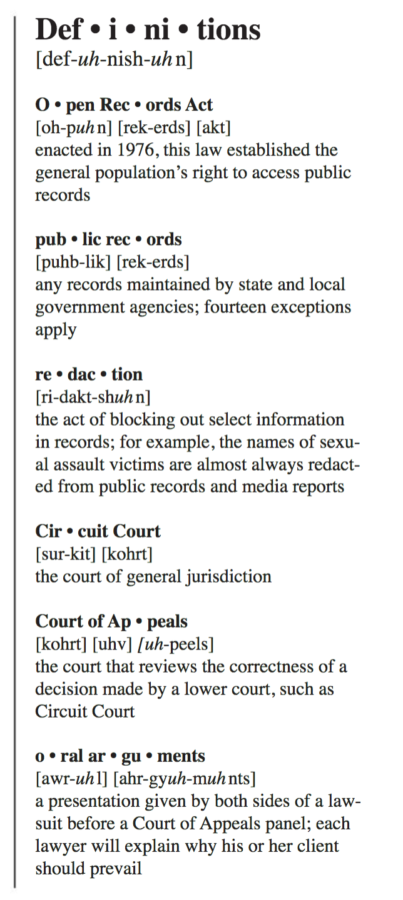The battle continues.
August 21, 2018
After nearly two years of legal proceedings, the Kentucky Kernel is still involved in three lawsuits concerning the obtainment of records about sexual misconduct at universities.
The Kernel’s pursuit of these open records began when the Kernel requested specific documents from UK: those concerning the investigation into sexual misconduct allegations against former UK professor James Harwood. Over the next several months, the Kernel once again made use of the Open Records Act to request records about sexual misconduct from other universities around the state, to see how they handled sexual misconduct allegations. Documents were requested from Western Kentucky University and Kentucky State University, among others.
UK, WKU and KSU declined to hand over the sexual misconduct records, citing student privacy as the reason the documents could not be provided to the Kernel. Suing the Kernel was the legal action that allowed the universities to avoid turning over the documents, so all three filed lawsuits against the Kernel.
In a statement made to the Kernel earlier this month, UK spokesperson Jay Blanton said the issue in these cases is “one thing and one thing only: whether a victim/survivor is given the right to determine how, when or even if to discuss the details of their story.”
In all three cases, the Kernel is represented by Tom Miller of Miller, Griffin & Marks PSC in Lexington.
“All [the cases] involve predatory activity by representatives of the university about which students and their families need to be aware to protect themselves and to decide whether they even want to go to that institution,” Miller said in a meeting with Kernel editors. “Now in the current environment, it is more than obvious why this information must be disclosed to the public and to the students that are in attendance there.”
The Open Records Act was established to give the public the right to access information concerning public institutions like Kentucky governmental offices or public colleges. Miller said the act would not be necessary at all “if we could trust the government to provide the information.” In addition to the sexual misconduct at these Kentucky universities, he cited the situations at Penn State, Michigan State and Ohio State that have come to the public’s attention in the last several years.
“It shows that universities cannot be trusted to disseminate the appropriate information to the public,” he said.
Because the attorney general has the statutory power to confidentially review documents, Attorney General Andy Beshear has requested many of the same documents as the Kernel and has expressed his support for the Kernel since the legal proceedings began. This review power is “necessary to avoid turning Kentucky’s Open Records Act into a ‘trust me’ law,” Beshear said in a recent statement.
“In the context of a university, it would allow an institution to hide serious issues,” he said. “We are appealing not just for public transparency but for our ability to hold public entities accountable for how they seek justice for those who have been harmed.”
While all of the cases started the same way and are focused on the issue of open records, each of the cases is now at a different point in the legal proceedings.
University of Kentucky
What has become a long legal battle began with the Kernel’s request for documents detailing the investigation into sexual misconduct allegations against Harwood, an entomology professor who resigned from the university on the same day that UK filed its lawsuit against the Kernel.
Months before, though, the Kernel wrote a story about Harwood based on a tip from two of his victims and limited documents provided by UK. At that time, the two victims told Kernel editors they were uncomfortable handing over official documents relating to the investigation, so the Kernel asked UK for them via the Open Records Act. In August, after UK said it would not hand them over, the victims decided to give those documents to Kernel editors, who wrote a follow-up story.
After UK officials said the documents would not be provided to the Kernel, the Kernel appealed to the attorney general, who asked for the records for him to review and was also refused by UK. He then said that UK had violated the Kentucky Open Records Act. Because a university cannot sue the attorney general, UK had to sue the Kernel to appeal that decision.
In January of 2017, almost a year after the documents were originally requested, Fayette Circuit Court Judge Thomas Clark ruled in favor of UK against the Kernel and Beshear, saying that redacting names and phone numbers would not be enough to protect the students’ identities and therefore the records should not be released.
After the ruling, UK President Eli Capilouto released a statement via email to all of campus. He said the ruling “without question” reinforced UK’s position that the requested records were educational and that “no amount of redaction” could protect the privacy of the victims.
The Kernel immediately appealed the circuit court decision. Then the waiting game began, as both sides filed briefs and others filed motions in favor of one side or the other.
“The court— in the only decision in this case thus far— has strongly and unequivocally agreed with the university’s position: our students’ privacy under the law must be protected,” Blanton said in a recent statement.
He said UK must do everything in its power to protect that right to privacy for its students.
On Aug. 13, 2018, the Kentucky Court of Appeals announced that it would hear oral arguments in both the Kernel’s and the attorney general’s cases.
When a decision is appealed, it is assigned to a panel of three judges, and the judges do not have to hear oral arguments. In fact, Kernel attorney Tom Miller said oral arguments are ordered pretty rarely. An oral argument is an opportunity for both the appellee and appellant to present new information to the judges in addition to the written material they have already received about the case.
“We have an opportunity,” Miller said. “I think it’s an advantage to us to be able to explain our position.”
Miller said he will be able to explain not only the legal significance but also the “human interest” in making sure students are protected.
“The best way to protect the students is a free flow of information,” he said.
Oral arguments will be heard on Sept. 25, 2018, by a panel made up of judges Robert Johnson, Denise Clayton and Joy Kramer. Miller said there is no time requirement for when the judges must issue a decision after hearing the arguments. Once the appeals panel makes its decision, the losing side could appeal that decision to the Supreme Court.
Kentucky State University
Like the UK lawsuit, this lawsuit began with the newspaper’s request, the university’s refusal and the attorney general’s assertion that the university was in violation of the Open Records Act. However, after Kentucky State University filed the lawsuit against the Kernel but before the hearing, KSU did give the Kernel some documents, but not all the documents pertaining to the Kernel’s request were provided.
The provided documents detailed investigations into the sexual misconduct of two KSU employees, Dr. Robert Lancaster and Kalomo Bailey The records included text messages and other inappropriate communication between Bailey and students, but all identifying information for students was redacted.
In October of 2017, a Franklin Circuit Court judge ruled that KSU needed to submit previously withheld documents for the attorney general to review them. The attorney general should have been able to review the documents and decide whether the documents could be released to the Kernel, but KSU appealed that decision, so the documents have not been delivered to Beshear.
Miller said it is significant that many of the records were ultimately given to the Kernel by KSU.
“There is obviously an understanding on the part of Kentucky State that these records can be provided in spite of their interpretation of FERPA, as long as the students’ names are properly redacted,” he said.
FERPA, or the Family Educational Rights and Privacy Act, is meant to protect educational records of students and has been cited by all three universities as justification to withhold documents.
In his order, the Franklin Circuit Court judge said that his decision disagrees with the earlier decision made by the Fayette Circuit Court judge in favor of UK. At the time, Kernel lawyer Miller said that was significant because the Kernel’s position now has support from a judge. He said last fall that he can now show the appellate court “there are lower courts that disagree with the Fayette Circuit Court decision.” In a few weeks, Miller will have the chance to make this point in his oral argument in the UK lawsuit appeal.
Western Kentucky University
After the Kernel began its investigation into sexual misconduct at universities across the state by filing open records requests with all public universities in Kentucky, the College Heights Herald at Western Kentucky University requested similar documents from WKU. Once again, when WKU declined to hand over the documents, the attorney general ruled that WKU was in violation of the Open Records Act. In response, WKU sued both the Kernel and the College Heights Herald.
The case between WKU and the Kernel is the least far along of the Kernel’s three cases, as both sides have filed briefs but no circuit court ruling has been made yet. The Warren Circuit Court judge is currently reviewing FERPA to decide how it applies in this situation.
With nearly two years of legal proceedings already past, it is unclear how much longer these three lawsuits will continue. Kernel editors and advisers have previously said that they will pursue this case as far as they must, including up to the Kentucky Supreme Court level.
“I believe that there is a very high probability of success because the Open Records Act requires the release of the information and documentation that we have requested,” Miller said when speaking specifically to the UK case, though the same logic applies in the other two as well.
Like former and current Kernel staff members, Miller said he is a “big believer” in what the Kernel is doing to acquire public records and hold universities accountable.
“It was important to enter into the fight to get these records,” he said.



























































































































































